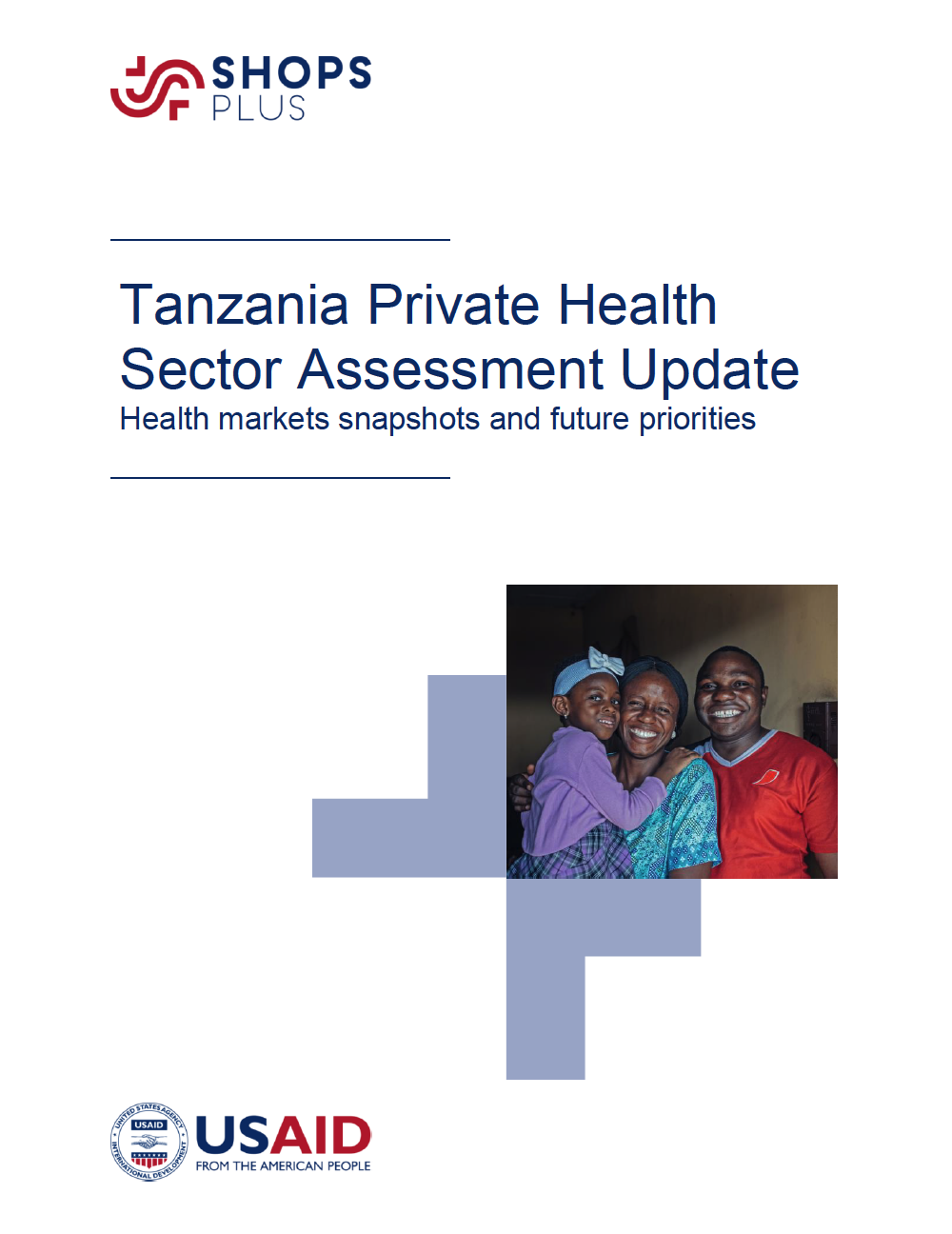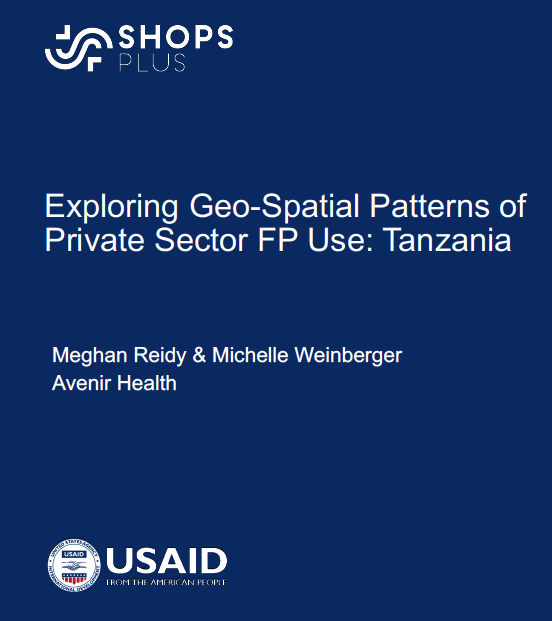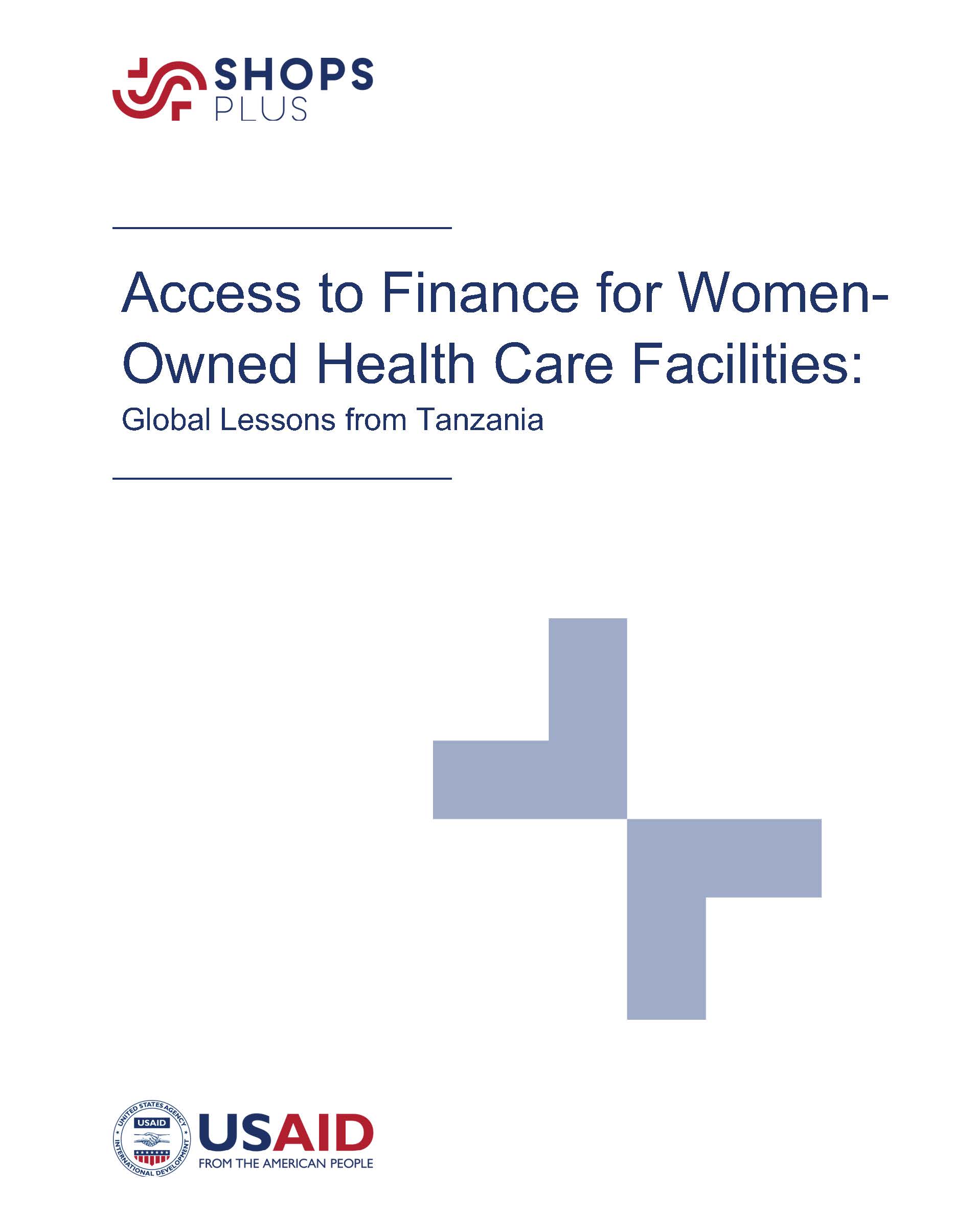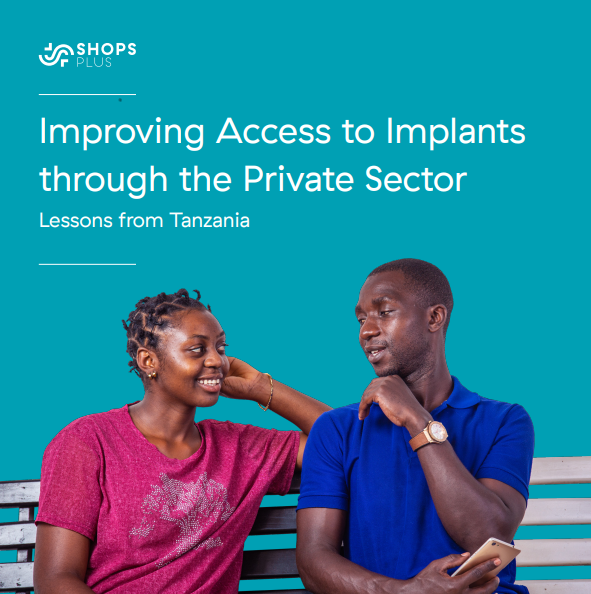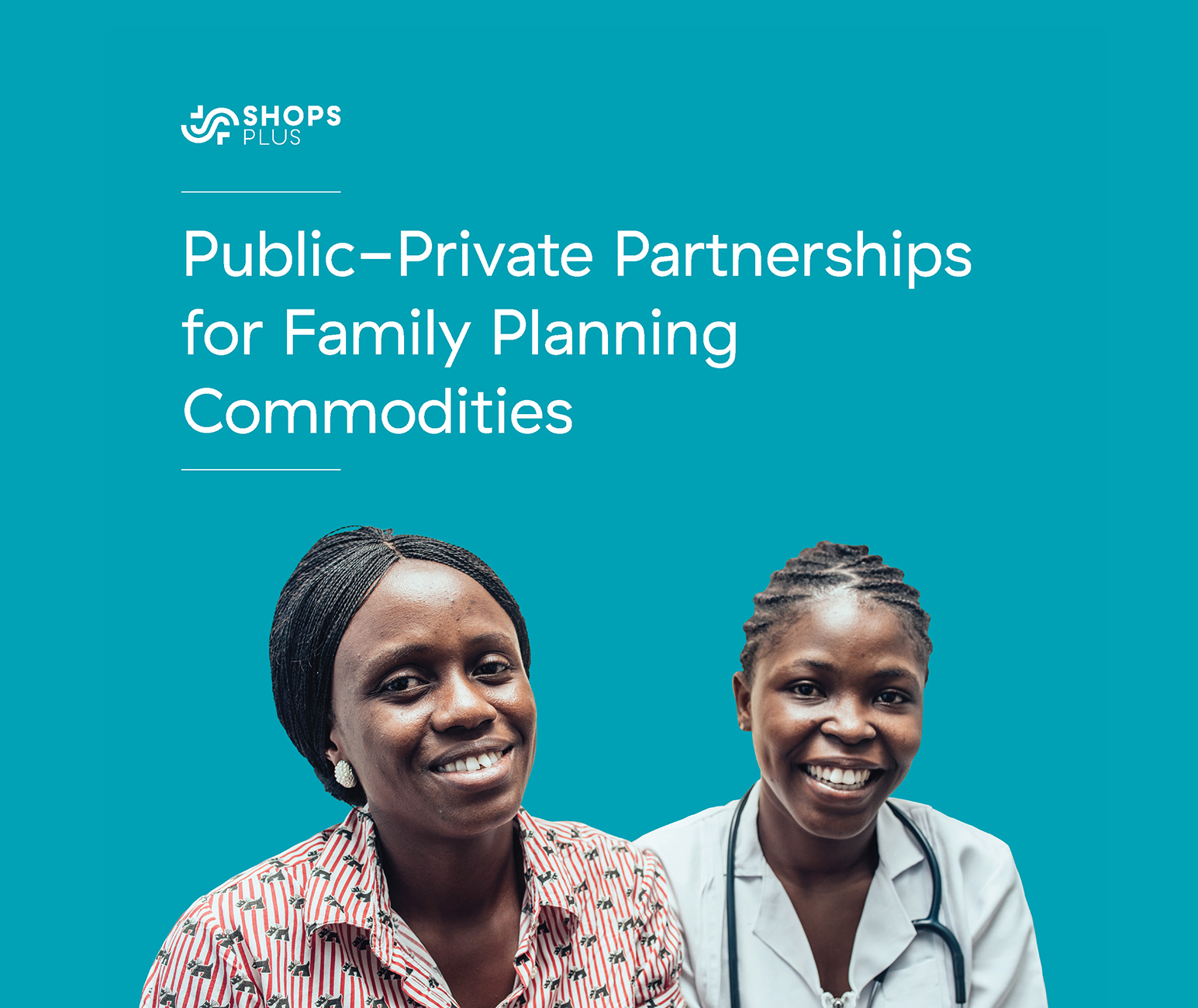
Resource Library
Implementing a Total Market Approach for Family Planning Products: Lessons from Tanzania
The SHOPS Plus project supported its partners in Tanzania in adopting a total market approach to strengthen the country’s family planning market. This case study documents the strategy that the project used to build capacity among public and private sector stakeholders to effectively coordinate at national and subnational levels with the goal of strengthening markets. It highlights lessons and implementation tips that other countries can apply to pursue similar efforts in their own family planning programs.
Resource Type : Brief
Country : Tanzania
Year : 2021-11-18T15:00:00
Language : English
Project : SHOPS Plus

Resource Library
Tanzania Private Health Sector Assessment Update: Health Markets Snapshots and Future Priorities
In 2012, the USAID-funded SHOPS project conducted an assessment of Tanzania’s private health sector to identify opportunities for increasing public-private engagement to improve health outcomes. The resulting roadmap has helped guide investments by the government of Tanzania and its donor partners over the past decade. This snapshot update reviews the progress made to implement priority strategies identified in the original assessment, changes in the private health sector landscape, and new opportunities and challenges that have emerged. The findings reveal a shifting health landscape in Tanzania, with substantial progress made toward integrating the private sector into the larger health system. New recommendations presented in this update can help guide future investments.
Resource Type : Brief
Country : Tanzania
Year : 2021-10-01T13:00:00
Language : English
Project :

Resource Library
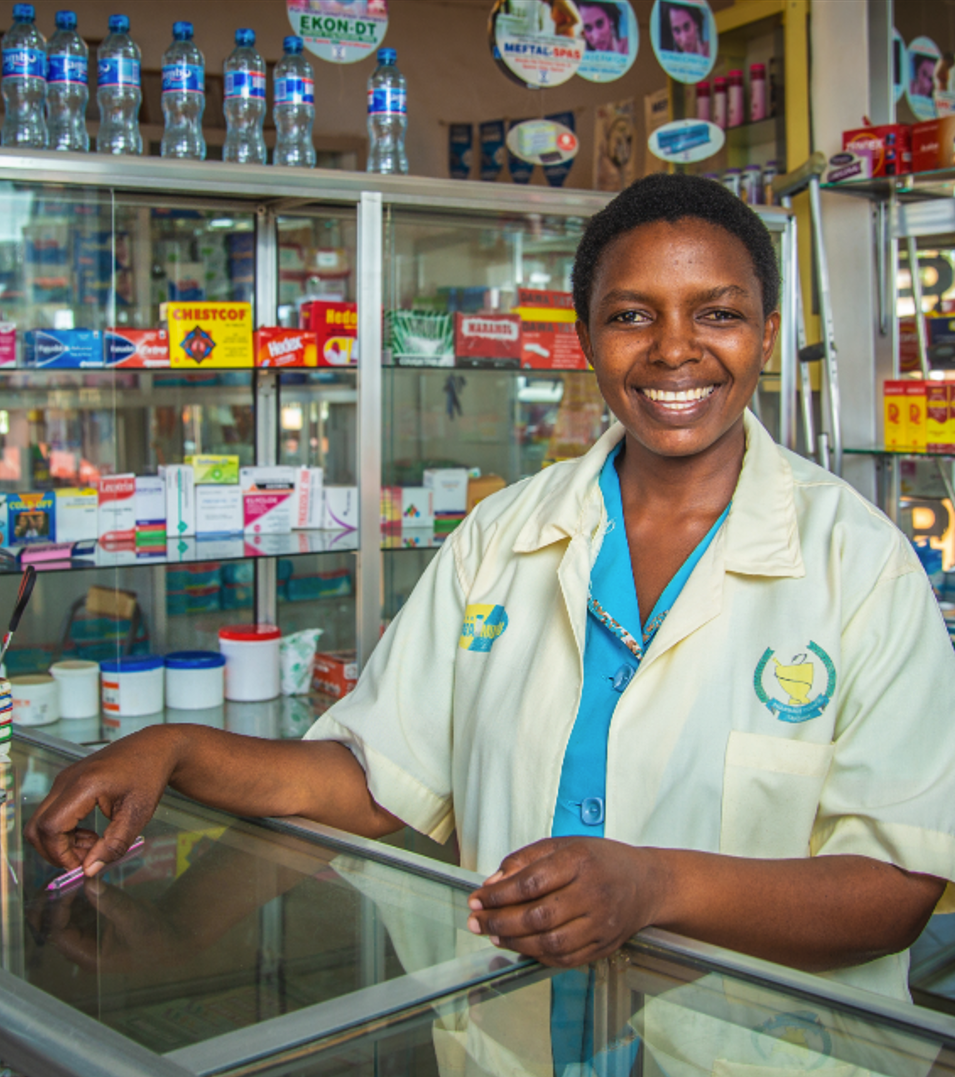
Webinar: Improving access to products and services through Tanzania’s private sector
Over the past 5 years the SHOPS Plus project in Tanzania has catalyzed private sector expertise engagement, improved human resources, introduced products and services, and increased access to finance to improve the country’s health outcomes.
SHOPS Plus and USAID/Tanzania hosted a virtual meeting highlighting the project’s accomplishments and showcased stories from our partners in both the private and the public sector. Discussions focused on improving access to health products and services in the country through advocacy, dialogue, capacity building, partnership, networking, and the application of total market approaches. The panel discussion concluded with next steps for private sector engagement in health.
Moderator
- Maureen Ogada-Ndekana, SHOPS Plus Chief of Party, Tanzania, Abt Associates
Panelists
- Machumu Miyeye, National Commodity Security Coordinator, Reproductive and Child Health Section of the Ministry of Health, Community Development, Gender, Elderly and Children
- Toyi Ruvumbagu, Head of Business Banking, CRDB Bank Ltd
- Samwel Ligmas Koyo, NIMART Coordinator, Director of Nursing Services
- Soumitra Ghosh, Senior Private Sector Advisor, SHOPS Plus, Abt Associates
- Peter Gondwe, Senior Sales Executive and Application Specialist, Sciex Limited
Resource Type : Webinar
Country : Tanzania
Year : 2021-09-16T15:00:00
Language : English
Project :

Resource Library
Exploring Geo-Spatial Patterns of Private Sector FP Use: Tanzania
Existing tools allow for exploration of patterns of public and private sector contraceptive use segmented by key demographics such as age, marital status, or urban/rural residence. While useful to understand differentials in the use of the public and private sector, these approaches do not provide a view into geographic differences across a country. Utilizing an approach known as small area estimation, SHOPS Plus has developed a series of "heat maps" for five countries that explore how contraceptive use and use of the public and private sectors varies across a country. Maps provide both relative views (e.g., the share of women using the private sector) and absolute views (e.g., the number of women using the private sector) as both can be useful for different advocacy and planning needs. Maps also overlay useful contextual information such as the location of cities, towns, roadways and health facilities. The five countries covered by this work are: Guinea*, Kenya, Nepal, Uganda, and Tanzania.
*Guinea analysis also includes select Child Health indicators
Resource Type : Presentation
Country : Tanzania
Year : 2021-09-14T13:00:00
Language : English
Project : SHOPS Plus

Resource Library

EOP series: Accelerating private sector engagement: What the future holds
During this webinar, the last in the end-of-project series, leaders from the project reflected on results and implications. With special guests from USAID, FP2030, and the David and Lucile Packard Foundation exploring what the future holds. Susan Mitchell, project director for SHOPS Plus, opens the webinar with an overview of the projects acheivements.
Since 2015, SHOPS Plus has sought to harness the full potential of the private sector and catalyze public-private engagement to improve health outcomes and increase access to family planning, HIV/AIDS, maternal and child health, and other priority health services.
Moderator:
- Caroline Quijada, Deputy Project Director, SHOPS Plus, Abt Associates
Speakers:
- Mbogo Bunyi, Senior Private Sector Advisor, SHOPS Plus, Abt Associates
- Ramakrishnan Ganesan, Senior Private Sector Advisor, SHOPS Plus, Abt Associates
- Jeanna Holtz, Health Financing Director, SHOPS Plus, Abt Associates
- Emily Mangone, Digital Health Specialist, SHOPS Plus Abt Associates
- Michelle Weinberger, Modeling and Segmentation Advisor, SHOPS Plus, Avenir Health
Guest speakers:
- Chonghee Hwang, Director, Country Engagement and Transition (Africa and Asia), FP2030
- Kuyosh Kadirov, Senior Private Sector Advisor, U.S. Agency for International Development
- Anand Sinha, Country Advisor, India, the David and Lucile Packard Foundation
Resource Type : Webinar
Country : India, Madagascar, Nepal, Senegal, Tanzania
Year : 2021-07-20T13:00:00
Language : English
Project :

Resource Library
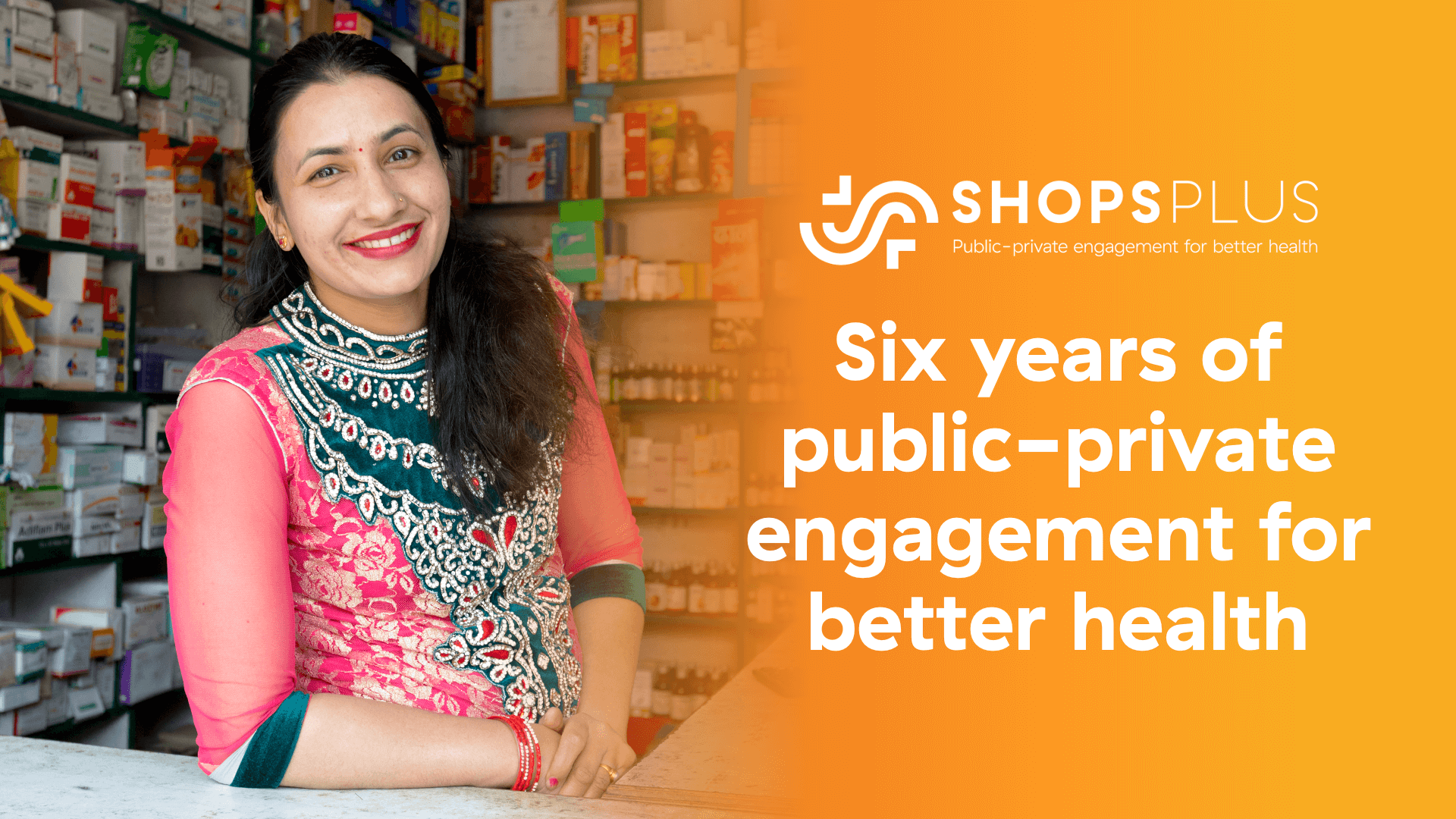
Video: Highlights from SHOPS Plus - Six years of public-private engagement for better health
Watch highlights from six years of SHOPS Plus engaging the private sector in health.
The video was shown July 14, 2021, during the webinar “Accelerating private sector engagement: What the future holds.”
Resource Type : Video
Country : India, Kenya, Madagascar, Nepal, Nigeria, Rwanda, Senegal, Tanzania
Year : 2021-07-15T12:30:00
Language : English
Project :

Resource Library
Access to Finance for Women-Owned Health Care Facilities: Global Lessons from Tanzania
The private health sector plays a critical role in meeting the health needs of women and the broader population. In fact, in many countries the private sector is a key provider of family planning, reproductive health, and maternal, newborn and child health. Reliance on the private health sector continues to grow and as a result, there is an increased need for investment—investments to meet demands in terms of capacity, availability of health services and quality. The challenge the private health sector faces, and in particularly small- and medium-sized facilities, is difficulty in securing access to loans for these investments. While this constraint is universal for all small and medium enterprises, regardless of gender, it tends to disproportionately affect women-businesses.
SHOPS Plus conducted a study of women franchisees, which analyzed how women owners of private health sector facilities are empowered by the increased opportunities social franchising provides. This report shares the main findings from the study and offers solutions to facilitate access to finance.
Resource Type : Report
Country : Tanzania
Year : 2021-07-09T12:05:00
Language : English
Project :

Resource Library
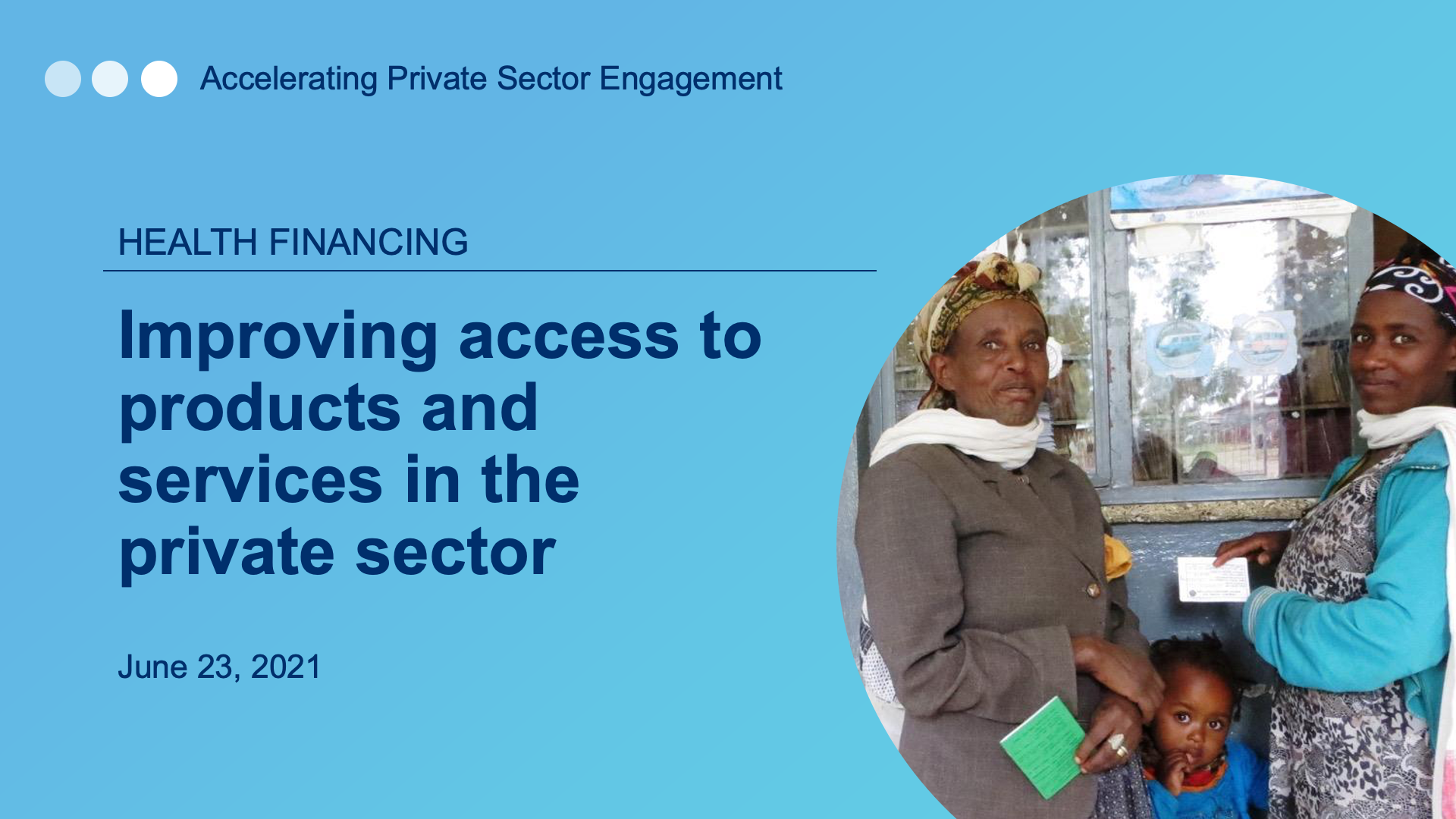
EOP series: Improving access to products and services in the private sector
This webinar examined three models of financing private provision of services, and lessons learned from a variety of country contexts on removing financial barriers to access care from private health providers.
Financing underpins the ability of citizens to equitably access priority services and products in the health system—including from the private sector.
View the SHOPS Plus end-of-project series at www.shopsplusproject.org/EOPSeries.
Resource Type : Webinar
Country : Dominican Republic, Sénégal, Senegal, Tanzania
Year : 2021-06-25T15:00:00
Language : English
Project :

Resource Library
Improving Access to Implants through the Private Sector
The popularity of contraceptive implants is rapidly increasing in low- and middle-income countries, particularly in East Africa where implant users typically obtain the method from government and NGO-supported clinics. In Tanzania, two barriers limit the ability of for-profit private clinics to offer implant services to their clients: sporadic access to training and challenges in obtaining commodities. To address these barriers, SHOPS Plus trained 39 private providers in comprehensive family planning services, including implant insertion and removal. The project also facilitated partnerships with the public sector that enabled providers to receive a supply of free commodities. Six months later, the providers had performed 1,390 implant insertions and 359 removals, with few stockouts. However, the public supply solution made private services dependent on product donations and generally prohibited facilities from charging for implant services. The creation of a private source of implants proved unfeasible as providers were not willing to pay for products as long as they could get them at no cost from the government. SHOPS Plus found that service level agreements between private providers and the government can be highly effective in increasing the volume of implant services but present sustainability challenges. Increasing the viability of this method in the private sector over the long term requires more sustainable training and supply options. Authorities should recognize that for-profit private providers need to charge for services and relax barriers to the distribution of implants through commercial channels.
Pictured above: Providers who received training in Arusha, September 2019
Resource Type : Brief
Country : Tanzania
Year : 2021-06-14T12:01:27
Language : English
Project : SHOPS Plus

Resource Library
Public-Private Partnerships for Family Planning Commodities
Many governments and donors support the use of public-private partnerships to distribute publicly managed commodities through the private health sector to overcome barriers to access for the full range of family planning methods. This brief draws on country experiences with commodity partnerships for family planning in Kenya, Nigeria, and Tanzania. It documents approaches used to place government-managed commodities into the hands of private providers and ultimately the women seeking the method. It examines factors that motivated public and private actors to pursue partnerships to enable private sector provision of long-acting reversible contraceptives, and how well the implementation of the partnerships aligned with those motivations. The brief discusses the challenges and lessons learned from this experience, and concludes with reflections about when and how donors and governments might decide to replicate, improve, or scale up these partnerships.
Resource Type : Brief
Country : Kenya, Nigeria, Tanzania
Year : 2021-03-26T14:00:00
Language : English
Project : SHOPS Plus
Pagination
- Previous page
- Page 3
- Next page



